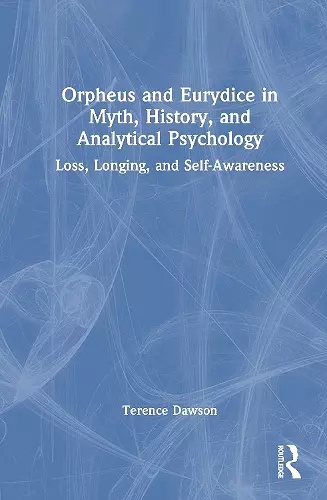Orpheus and Eurydice in Myth, History, and Analytical Psychology
Loss, Longing, and Self-Awareness
Format:Hardback
Publisher:Taylor & Francis Ltd
Published:25th Feb '25
£140.00
Supplier delay - available to order, but may take longer than usual.
This hardback is available in another edition too:
- Paperback£32.99(9781032857305)

This fascinating study shows how the minor Greek story of Orpheus and Eurydice came to have a more persistent and varied impact on Western culture than any other Greek myth. In the last 2,000 years, it has captivated the imagination of successive ages. Writers and other artists have turned to it to explore unexpectedly diverse concerns, from classical philosophy, through Christian values, to challenges involving individual psychology and societal well-being.
Dawson’s study of the mythic imagination traces how these concerns unfold in poems, plays, novels, films, paintings, operas, ballets, and sculptures. It charts a history of responses to the experience of loss and longing and the need to grow in self-awareness. And it illustrates how responses to this myth anticipate many of the claims associated with analytical psychology.
This book will be of interest to analysts, scholars, and students working with Jung’s ideas, and to all those interested in adaptations of myth and the implications they harbour.
‘Terence Dawson shows how the myth of Orpheus and Eurydice has evolved over the last two thousand years, always reflecting the specific time, place and culture in which it has appeared. Intrinsically polymorphous, it circles around core human concerns: the emotions engendered by loss, longing, and a descent into darkness to recover something important to collective identity and individual spiritual well-being. Dawson makes a seminal contribution to the study of mythology and the role of affect laden archetypal patterns in human affairs and offers a stunning exploration of their reality’.
Thomas Singer, co-editor of Ancient Greece, Modern Psyche: Archetypes Evolving (Routledge, 2015)
‘A breathtakingly expansive vision of the trajectory of the myth of Orpheus and Eurydice through western history and culture from Virgil and Ovid until contemporary times is offered fortunate readers. By attending to the affect-charged metaphors operating in myths, the concerns of the tellers in the contexts of their cultures are revealed. In this erudite exploration of literature through the lens of analytical psychology, Dr Dawson’s transdisciplinary appreciation of myth across a broad historical frame provides a valuable means of moving beyond essentialist readings of archetypal and mythic patterns to more deeply reveal their living qualities’.
Joseph Cambray, PhD, IAAP, former President-CEO Pacifica Graduate Institute, former President IAAP, and author of Synchronicity: Nature and Psyche in an Interconnected Universe (Routledge, 1985)
‘Story is how we know who we are. Dawson’s superb scholarly and insightful exploration of the perennially fascinating Orpheus and Euridice myth is a stunning journey into the depths of the unbearable yet transformational initiations into grief, love, and re-making being. Via philosophy, religion, art and Jungian psychology, this marvellous book traces the thread of consciousness centred on love and death. From Virgil to Woody Allen, pastoral to painting, opera to ballet, Dawson presents an archetype that haunts and remakes modernity. We need this book’.
Susan Rowland, PhD, Pacifica Graduate Institute, California, author of Jungian Arts-Based Research and the Nuclear Enchantment of New Mexico (Routledge 2021)
‘In this inspiring study, Dr Terence Dawson draws on his impressive scholarly and psychological expertise to help us see why the myth of Orpheus and Eurydice has been retold and recast more often than any other. Its topic is the unbearable loss we face in our mortality. The diverse and evolving retellings of this story offer a powerful self-renewing hope that our lives become meaningful when we embrace the lessons of loss with gratitude that we have this unique but paradoxical opportunity to love what does not endure and cannot be perfected’.
Polly Young-Eisendrath, PhD, Jungian Analyst and Psychologist, author of The Present Heart: A Memoir of Love, Loss, and Discovery
‘The focus of Dr Dawson’s excellent, interdisciplinary analysis of the metaphors of loss, longing, and self-awareness at the heart of the myth of Orpheus and Eurydice is not centred on the ‘story’ but on how each generation defines these issues differently as a specific ‘concern.’ Using C.G. Jung’s definition of myth as belonging to the collective unconscious and ‘feeling toned complexes’, this innovative re-evaluation of the collective and individual concerns expressed through the myth emphasises its international, interdisciplinary nature and offers unique, creative perspectives that simultaneously unravel specific time-based societal concerns’.
Dr Elizabeth Brodersen, accredited Jungian Analyst and Supervisor, CGJIZ, editor of Jungian Dimensions of the Mourning Process, Burial Rituals and Access to the Land of the Dead: Intimations of Immortality (Routledge, 2024)
‘According to Malinowski, myth is the re-arising of a primordial reality in narrative form; and in this book, Terence Dawson offers a fresh and insightful demonstration of what this really means in the case of Orpheus and Eurydice. Combining an extensive range of topics with his usual remarkable depth of interpretative analysis, Dawson moves with ease from ancient classical sources to modern texts, including cinema. With an innovative thesis and written with lucidity yet passion, this book shows us what it truly means to say that a myth is alive’.
Paul Bishop, University of Glasgow, author of On the Blissful Islands with Goethe & Jung (Routledge, 2017)
‘In this magisterial history of the myth of Orpheus and Eurydice, Terence Dawson traces the story’s variants through the centuries, always with a keen eye for the political and social concerns embedded in each narrative, boldly showing how this atypical Greek tale has become one of the most important myths of our time’.
Craig E. Stephenson, author of Anteros: A Forgotten Myth (Routledge, 2011)
ISBN: 9781032857312
Dimensions: unknown
Weight: 539g
192 pages